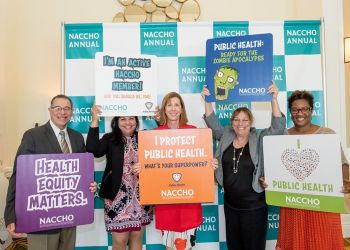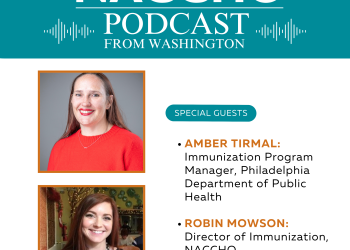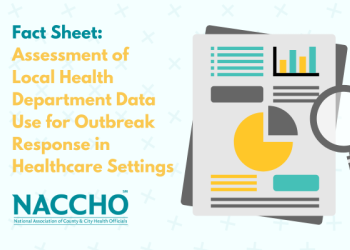National Association of County and City Health Officials Awards New Overdose Response Project Funding
— Public Health Projects in California, Connecticut, Florida, Maine, Michigan, Missouri, North Carolina, Pennsylvania, South Carolina, and Vermont Receive Funding Ranging From $50,000 to $100,000 —
Washington, DC, January 26, 2023 — The National Association of County and City Health Officials (NACCHO), representing the country’s nearly 3,000 local health departments, has awarded nearly $750,000 in funding to 10 Overdose Response Strategy (ORS) pilot projects to help address the overdose crisis in those communities. With support from the Centers for Disease Control and Prevention (CDC), these funds will support 10 ORS teams crossing the public health and public safety sectors that will explore collaborative approaches for responding to the overdose crisis.
The United States is experiencing unprecedented levels of overdose deaths, with synthetic opioids driving a significant portion of both fatal and nonfatal overdoses. While overdose deaths continue to increase among all groups, Black and Indigenous communities are disproportionately impacted and are exacerbated by social determinants of health, such as income inequality. Life expectancy has declined in the United States by 2.7 years from 2019 to 2021, and Indigenous communities experienced the largest decline in life expectancy in this timeframe, decreasing by 6.6 years from 71.8 years to 65.2 years. COVID-19 and unintentional injuries – which largely consist of fatal overdoses – account for the top two causes of decreases in life expectancy among Indigenous populations, with each cause accounting for just over 21% of the decrease.
“As the United States reckons with the impact of the overdose crisis and the ways in which social determinants of health and structural inequities contribute to this crisis, it is critical that local health departments, community-based organizations, and first responders center the needs and priorities of the most-affected communities in their prevention and response efforts,” said Lori Tremmel Freeman, NACCHO Chief Executive Officer. “Partnerships with CDC, ORS pilot project leaders, and the High Intensity Drug Trafficking Areas program administrators will advance existing outreach and create new avenues of help and support in local communities most affected. We look forward to supporting these pilot sites to reduce the terrible impact of the opioid crisis and save lives.”
The ORS is a public health and public safety collaboration between the Centers for Disease Control and Prevention and the Office of National Drug Control Policy’s (ONDCP) High Intensity Drug Trafficking Area (HIDTA) program, supporting joint efforts to reduce overdose deaths at the local, state, and regional levels. Pilot projects will address drug overdose prevention strategies that engage both local public health and public safety and will be implemented in collaboration with the regional HIDTA program. Goals of the project include building the evidence base for effective overdose prevention and response interventions, improving response to the opioid overdose epidemic, and leveraging the ORS structure to enhance community-level public health and public safety collaborations. NACCHO and CDC will work closely with the ORS state teams in each funded pilot project site to develop, execute, and evaluate the pilots. The proposed projects in the 10 funded locations are as follows:
EXPANSION AWARDS
THE COURAGE CENTER (SC)
The Courage Center (TCC) was awarded a third year of funding to build upon its post-overdose outreach project, the Coordinated Overdose Response and Engagement (CORE) in Lexington, South Carolina. In 2021, fentanyl was present in 75% of overdose deaths in Lexington, compared with only 28% in 2015. Additionally, non-fatal overdoses were 12% higher through August 2022 compared with the previous year. This overdose burden requires innovative outreach and community-centered approaches for care.
Through the CORE program, Emergency Medical Services, more commonly known as EMS, provides a pouch with resource cards and a prepaid cell phone to overdose survivors following naloxone administration. Within 72 hours, a recovery coach calls the phone provided in the pouch to offer survivors assistance accessing services like treatment, recovery, housing, and employment. Through a previous Expansion Award, TCC leaders have extended the reach of the CORE program using mobile technology, developed partnerships with their local hospital, enhanced their response to stimulant and polysubstance use, and focused community outreach in high-burden areas to increase successful linkages to treatment and recovery. TCC will use its current Expansion Award to enhance its partnerships and referral processes to better support people involved in the criminal legal system, in partnership with the Department of Probation, Parole and Pardon.
Location: Lexington, SC
Award: $97,315.90
NORTH CAROLINA HARM REDUCTION COALITION (NC)
North Carolina Harm Reduction Coalition (NCHRC) has received a fifth year of funding to continue, and expand upon, its jail-based overdose prevention education and naloxone distribution project. In North Carolina (NC), deaths due to medication and drug overdoses have steadily been increasing; more recently, heroin, fentanyl, and fentanyl analogues are resulting in increased deaths. COVID-19 has exacerbated the epidemic as the North Carolina Department of Health and Human Services announced that NC saw a 40% increase in fatal overdoses in 2020. Moreover, returning citizens face an increased risk of fatal overdose; a study of people who were formerly incarcerated in NC found that they had a 40 times greater risk of opioid overdose death within 20 weeks of release compared to the general NC population.
This pilot project has attained significant implementation goals, including creating a standardized overdose education training toolkit, recruiting, and training outreach specialists, initiating in-person overdose education and naloxone distribution in two NC county jails, and developing a jail staff training focused on reducing stigma and increasing referrals. Through this Expansion Award, NCHRC officials will also continue evaluation efforts for their newly developed digital curriculum, an overdose prevention training available on jail tablets, to be distributed across 24 jails in North Carolina participating with Paytel.
Location: In-person training will continue in Catawba and Haywood counties, and digital curriculum will be implemented in Bladen, Burke, Caswell, Catawba, Chatham, Davidson, Duplin, Edgecombe, Forsyth, Granville, Greene, Guilford, Harnett, Nash, Orange, Pitt, Randolph, Rockingham, Sampson, Scotland, Surry, Vance, Wilkes, and Wilson counties.
Award: $99,996.83
IMPLEMENTATION AWARDS
END OVERDOSE (CA)
End Overdose is a non-profit organization based in Los Angeles, California working to end drug-related overdose deaths through education, medical intervention, and public awareness. The Los Angeles County Substance Abuse Prevention and Control estimates that around 18% of 18 to 35-year-olds in the area regularly use opioids. From 2019 to 2020 in Los Angeles County, overdoses increased 200% for those ages 0 to 11 and 333% for those ages 12 to 17 years old, and at least seven teenage students have overdosed on fentanyl-laced pills between August 2022 and September 2022.
These statistics show the dire need for an overdose prevention and response educational and resource distribution program for students in Los Angeles County. End Overdose leaders plan to use their Implementation Award to increase the number of schools in LA County serving grades 7-12 whose students are prepared to respond to an opioid overdose on or off campus through overdose response trainings, listening sessions, and educational outreach. By focusing outreach and educational efforts in middle and high schools in LA County, End Overdose officials hope to increase students’ ability to recognize and respond to an overdose.
Location: Los Angeles County, CA
Award: $80,000.00
IN2ACTION (MO)
In2Action, located in Boone County, MO, provides transitional support and recovery services to people recently released from prison. Overdose is the leading cause of death among adults ages 18-44 in Missouri. The 2020 City of Columbia/Boone County, MO overdose rate is 18.03/100,000. From January 1, 2021 to September 1, 2022, police department officials reported 54 fatal overdoses in the City of Columbia alone.
Through its Implementation Award, In2Action will build upon existing efforts of the Central Missouri Recovery Coalition and the Boone County Overdose Response Coalition to develop a Trauma-Informed, Recovery-Oriented Systems of Care (TI-ROSC). The goal is to create a coordinated, person-centered network of community-based services and supports that build on the strengths and resilience of individuals, families, and communities to prevent overdose and improve health, wellness, and quality of life for those who use substances. The TI-ROSC will specifically focus on supporting people involved in the criminal legal system in its development; however, it will ultimately support the broader community as a whole.
Location: Boone County, MO
Award: $79.516.36
MAINE MEDICAL EDUCATION TRUST (ME)
Maine Medical Education Trust (MMET) has received its second year of funding after previously using a Planning Award to conduct readiness assessments and Strengths, Weaknesses, Opportunities, and Threats (SWOT) analyses with the aim of establishing Public Health and Safety Teams (PHAST) in all counties across Maine. MMET will use its current Implementation Award to offer distance education through Project ECHO (Extension for Community Healthcare Outcomes) to the county-level OPTIONS (Overdose Prevention Through Intensive Outreach, Naloxone and Safety) teams across the state. This work is critical as Maine experienced a 23% increase in overdose deaths in 2021 as compared to 2020. Moreover, over the first seven months of 2022, Maine experienced a 17% increase in overdose deaths. As overdoses and overdose deaths increase, the burden in responding to and treating overdoses puts pressure on public health and public safety systems at the local level.
The goal of the OPTIONS ECHO is to reduce drug overdose deaths by working with OPTIONS teams to incorporate best practices that are promoted and shared during the ECHO sessions in five key focus areas: (1) strengthening community capacity for responding to and preventing overdose; (2) recognizing and disrupting social stigma and discrimination associated with substance use; (3) increasing access to treatment and recovery supports; (4) promoting widespread availability to naloxone in the community; and (5) promoting ready access to recovery supports, including peer recovery.
Location: All Counties in ME
Award: $80,000.00
MICHIGAN PUBLIC HEALTH INSTITUTE (MI)
Michigan Public Health Institute (MPHI) will use its Implementation Award to develop Overdose Fatality Review (OFR) teams in Genessee, Tuscola, and Washtenaw counties, with a goal of reducing overdose deaths. According to the Substance Use Vulnerability Index (SUVI), a tool created by the MI Department of Health and Human Services, Genesee County has the highest 5-year average fatal overdose rate in the state, Tuscola County’s number of fatal drug overdoses more than doubled from 2014-2020, and Washtenaw County has a 5-year average fatal overdose rate of 20.3 per 100,000 people. By working in conjunction with local agencies in these counties to develop OFRs, MPHI leaders can increase shared understanding of overdose related deaths, identify gaps and barriers in the community response to overdose prevention, and optimize overdose response capacity through collaborative problem-solving.
Location: Genesee, Tuscola, and Washtenaw Counties, MI
Award: $80,000.00
SMA HEALTHCARE, INC. (FL)
SMA Healthcare, Inc. (SMA) provides Medication Assisted Treatment in Volusia County, FL. Volusia County is experiencing the opioid epidemic at a significantly higher rate than Florida, and it is the leading cause of death in the county. In 2019, prior to the COVID-19 pandemic, overdose deaths in Florida occurred at the rate of 27.1 per 100,000 population; in Volusia, the rate was 37 per 100,000. In 2020, Florida overdose deaths increased to 36 per 100,000. During the same period, Volusia County skyrocketed to 69.2 per 100,000.
SMA plans to use its Implementation Award to increase access to medications for opioid use disorder (MOUD) by providing transportation to decrease barriers to starting MOUD, as well as increase patient retention. SMA will hire and train drivers in situational awareness, recovery encouragement, listening skills, trauma 101, and empathetic responding skills, as well as create comprehensive resource guides that drivers can provide to the clients. These drivers will provide transportation for clients with low incomes who live in areas who lack access to transportation to MOUD providers. SMA will also conduct active outreach to partnering agencies and organizations who have contact with people who use substances to increase awareness about free transportation to MOUD.
Location: Volusia County, FL
Award: $80,000.00
PLANNING AWARDS
BHCARE, INC. (CT)
BHcare in New Haven, Connecticut is a Certified Community Behavioral Health Clinic that provides a comprehensive and integrated system of care, with wrap-around services for adults, children and families struggling with mental health, substance use, domestic violence, and other health-risk behaviors. Through their Planning Award, BHcare seeks to coordinate partners to develop procedures and establish capacity for a post-overdose outreach team to serve community members in the New Haven Judicial District that have been historically underserved. This will include convening a community advisory board, creating an Overdose Response Taskforce, and assessing the capacity of community partners. This work builds upon the current CT River Valley Comprehensive Overdose Engagement public health/public safety project, which provides support to overdose survivors through post-overdose outreach and follow-up.
Connecticut currently ranks tenth among states in the US for opioid-involved age-adjusted overdose death rates, and the statewide rate of fatal overdoses increased by more than 14.3% since 2019. Specifically, the rate of fatal overdoses in New Haven during 2020 was more than double the state rate for fatal overdoses, and the city has one of the highest overdose mortality rates in the region.
Location: New Haven, CT
Award: $50,000.00
CENTRAL VERMONT MEDICAL CENTER (VT)
Central Vermont Medical Center is a medical center that is a primary health care provider for 66,000 people throughout Central Vermont. Through its Planning Award, Central Vermont Medical Center will design a post-overdose system of care to improve access to treatment and recovery services that will decrease fatal overdoses and improve the health of Central Vermonters who use substances. According to the CDC, Vermont had the largest percentage increase of deaths in the country during the 12 months ending in April 2021 amid the COVID-19 pandemic (US 27.2% versus VT 70%). This proposed project will focus on Central Vermont, including Washington County, which had the third highest number of overdose deaths in the state (a record 23 deaths) and second among rural counties, according to the Vermont Department of Health.
Through this project, Central Vermont Medical Center will plan for the development of a short-term stabilization center that will function as critical infrastructure in the system of care. It will provide, among many things, immediate access to post-overdose counseling, medically assisted withdrawal, access to peer recovery coaches, and additional services that address the social determinants of health such as transportation and housing. The goal is that this center would offer a safe place to go for those who decline transportation to an emergency department after surviving an overdose, as well as provide additional supports for people who are discharged from emergency departments in the area.
Location: Central VT
Award: $49.923.39
DELAWARE COUNTY EMERGENCY SERVICES (PA)
In 2018, Delaware County had nearly twice the rate of fatal overdoses than the country as a whole. In 2021, there were 195 documented fatal overdoses in the county. While Delaware County has an existing post-overdose outreach program, the Delaware County Emergency Services will use their Planning Award to identify how best to support historically underserved communities with high overdose rates through a program that provides naloxone and other supportive resources.
Through this project, Delaware County Emergency Services will formalize relationships to provide harm reduction services, including establishing relationships with peer support groups and establishing a community advisory board that includes people with lived experience. Delaware County will also identify locations to provide increased access to naloxone through both ODMap and outreach to people who use substances.
Location: Delaware County, PA
Award: $50,000.00
###
About NACCHO
The National Association of County and City Health Officials (NACCHO) represents the nation’s nearly 3,000 local governmental health departments. These city, county, metropolitan, district, and tribal departments work every day to protect and promote health and well-being for all people in their communities. For more information about NACCHO, please visit www.naccho.org.





